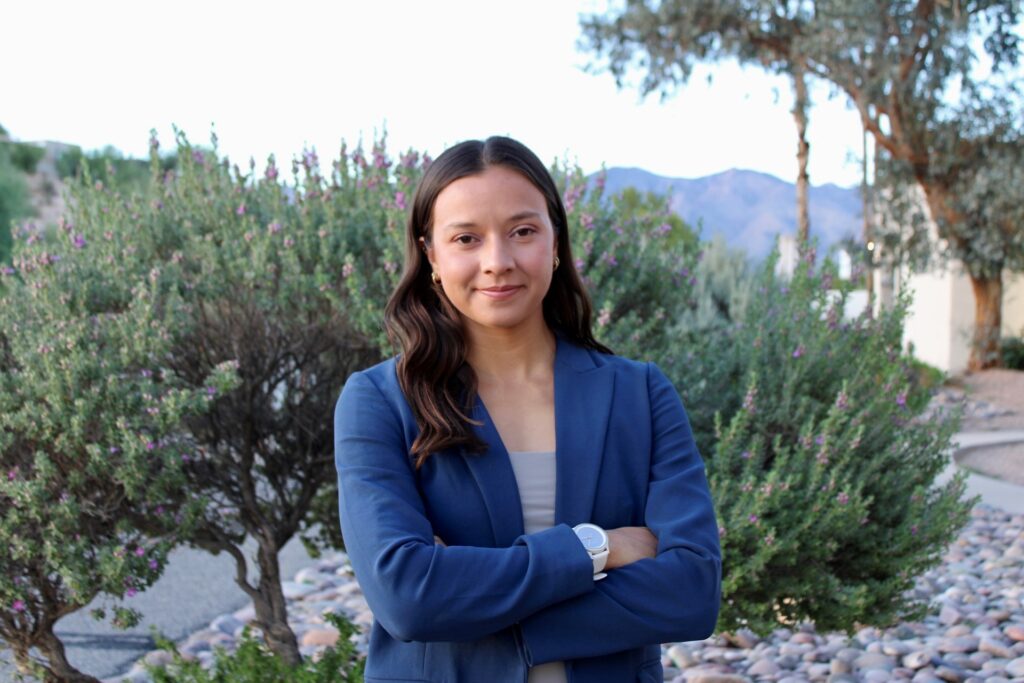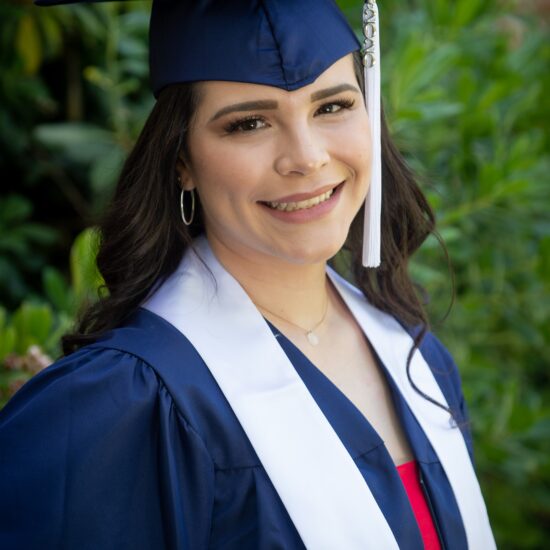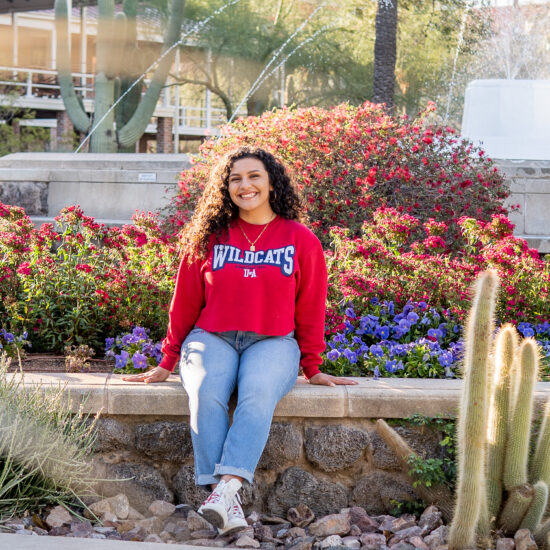SALA welcomed law student Hannah Kate Albach during the summer of 2025 as our fifth-annual David A. Paige Clerk. This paid internship position was graciously funded by the David A. Paige Foundation for a third time. This summer the Paige Clerk served in SALA’s Consumer Housing Public Benefits Unit (CHPB) and with SALA’s Criminal Rights Restoration Unit.
About the David A. Paige Clerkship: David A. Paige gave Arizona his incredible legacy of excellence in lawyering, commitment to his community, mentoring, and passion for volunteering. His family has established the David A. Paige Clerkship in his memory and to carry on his legacy. Paige grew up on the west side of Phoenix and came to law school at the University of Arizona in 1972, an experience that “transformed him,” according to his family. He spent 35 years practicing law and mentoring other lawyers and future judges in Tucson. His volunteer work with a soup kitchen and with Haitian refugees left him with a commitment to serving those in need and with a sense of the importance of access to civil legal aid. It is our hope that this opportunity will similarly transform those law students who serve clients in this grant-funded position at SALA.
About SALA: SALA is a non-profit 501(c)(3) public-interest law firm, established in 1951, which provides free, civil legal aid to low-income individuals and families in 9 of Arizona’s 15 counties and in 11 of Arizona’s 21 Native American Communities. Through SALA’s CHPB unit, SALA assists eligible clients facing evictions, foreclosures, wage garnishments and denials of public benefits, such as AHCCS benefits, Social Security benefits, and the like. Through SALA’s Criminal Rights Restoration Unit, SALA assists eligible clients restoring their civil rights after meeting the law’s requirements to do so.
About CHPB: CHPB assists tenants facing evictions. Where possible, CHPB lawyers provide defenses to tenants facing evictions. In all cases CHPB’s attorneys provide our clients guidance through what is a frightening and stressful legal process. As housing is a basic need for all, CHPB is dedicated to preventing evictions when possible. Even though Arizona’s fast-track eviction process favors landlords, making eviction prevention often difficult, CHPB pursues all available and valid defenses to prevent evictions. When faced with an adverse ruling, CHPB will seek appellate review if and when a solid legal basis exists. CHPB is constantly monitoring cases looking for ones with appealable issues. CHPB also assists eligible clients when faced with issues arising in an appeal of a denial of Social Security Disability Income benefits, overpayment of Social Security benefits, unemployment benefits, termination of AHCCS benefits and other public benefits issues.
About Hannah: Hannah Kate Albach, originally from Charleston, SC, moved to Tucson in 2024 to attend law school at the University of Arizona James E. Rogers College of Law. After graduating magna cum laude from Pepperdine University in 2022 with a double major in International Studies and Hispanic Studies, she worked as a legal assistant and receptionist at a boutique, private immigration law firm in Charleston for a couple of years. Through many interactions with clients, Hannah Kate developed a passion for humanitarian immigration law and direct client services.
Although Hannah Kate did not always know she wanted to be a lawyer, her dedication to human rights and uplifting marginalized and impoverished communities began at a very young age. Raised in a Christian household, serving others became a pillar of her values. Her mother, Cyndi Russell-Albach, has dedicated her career to working as an English teacher at an inner-city high school in North Charleston, SC. Cyndi always went above and beyond as a teacher and garnered the title “Mama Russell” by consistently giving students rides home from school, hosting end-of-the-year cookouts, bringing her family to many sporting events, and attending college graduation ceremonies. Hannah Kate did not know poverty firsthand, but as a child she was surrounded by and looked up to high school students experiencing poverty and who continued to show up to class while often supporting their own families. Through this experience, Hannah Kate learned the extent to which privilege can impact a student’s success and she became keenly aware of the contribution her upbringing had in academic success.
Following graduating from high school, Hannah Kate spent the summer before college volunteering at Mi Esperanza, a small nonprofit organization in Tegucigalpa, Honduras. Mi Esperanza’s mission is to break the cycle of poverty for struggling Honduran families by providing education programs, microloans, and ethical employment opportunities to women who qualified for their services. Hannah Kate was profoundly impacted by these women, their stories, and their strength.
When she started her undergraduate studies, she decided she would do whatever she could to learn Spanish. She jumped into her Hispanic Studies major and spent the next four years struggling to gain proficiency in language. Although it didn’t come naturally, Hannah Kate wanted to able to communicate well with the women she met at Mi Esperanza. She returned to intern the following summer, this time with a little more Spanish. The wisdom she gained from the Mi Esperanza students continues to shape and inform her world view today. After glimpsing the lives of these women, the gang infiltration of their neighborhoods and their fight for economic stability, she understood why many risk everything to make the treacherous journey north.
After graduating from Pepperdine, Hannah Kate struggled to find a job in the nonprofit sector working with the communities she was passionate about helping, until she landed the role at the private immigration practice. While at the firm, Hannah Kate assisted with many humanitarian visas and forms of relief. The clients she served appreciated the honest and quality work the Torres and their staff provided. Her favorite assignments were legal research, complex immigration cases, and engaging directly with clients. She realized law school may be her next step after all. Thus, Hannah Kate made the journey out West to attend a law school closer to border and in her mind, right in the middle of the action.
Ironically, the David A. Page Clerkship seemed to fall in her lap. Hannah Kate knew nothing about housing law and her property law class was not her favorite 1L course. Nevertheless, during the interview process, Hannah Kate recognized there was something special about the hodgepodge of personalities and comradery among the panel of SALA staff attorneys who interviewed her. She simply recognized this is the kind of place she wanted to work this summer. Hannah Kate was looking to expand her experience and gain insight from a variety of public-interest attorneys; this clerkship was the perfect summer internship. While her drive to assist noncitizens continues as she serves on the Board of the Immigration Law Students Association at Arizona Law, she has developed a new interest in housing law and policy—maybe one that will carry over into her future law career.
During her time at SALA, Hannah Kate has drafted motions defending eviction actions, researched a variety of housing law issues, drafted petitions to seal and expungements in the Civil Rights Restoration Unit, conducted client interviews and drafted declarations, drafted Rules Petitions in collaboration with other SALA attorneys and the Morris Institute for Justice, assisted with and attended hearings and trials at the Pima County Justice Court, and developed strong relationships with key players in Tucson and Phoenix fighting for tenants’ rights. This school year she looks forward to researching and writing her Note for the Arizona Law Review on the issue of crime-free lease addendums which were initially developed and implemented in Arizona and have since become a huge detriment for “othered” and disenfranchised tenants across the United States.
Hannah Kate hopes to graduate the James E. Rogers College of Law in 2027 and hit the ground running. She wants to pursue a legal career which seeks not only provide legal services for those who need them most, but also pressures lawmakers to adopt policies that will actually upend systemic oppression and entrenched poverty.




